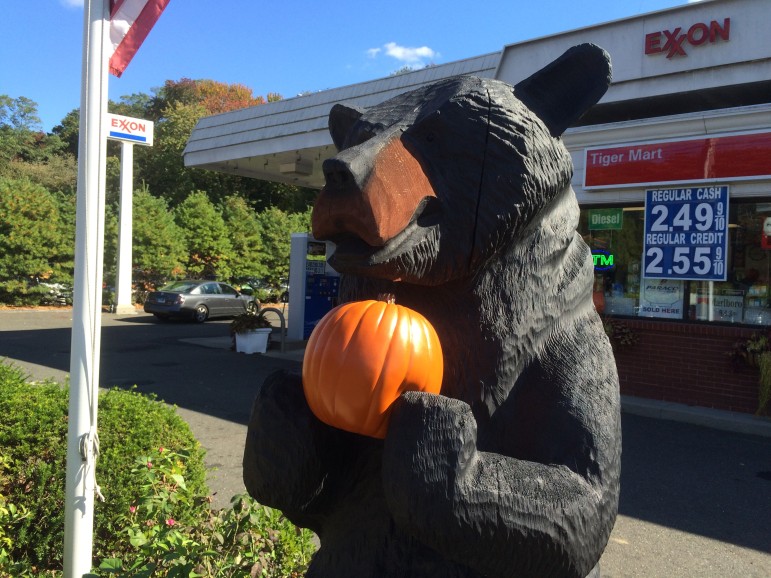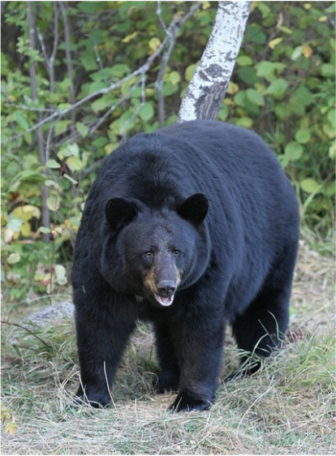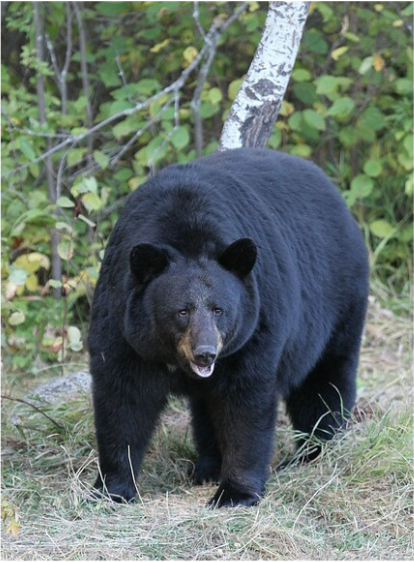There’s a young black bear in Tokeneke, although it “is not considered a threat to people or animals,” police say. Its presence does call for some care, however, according to a police announcement.
The bear, weighing about 100 pounds, was seen Thursday. According to the Darien animal control officer, it’s a good idea for people living in or near Tokeneke, in the southeast part of town, to avoid attracting the beast by putting bird feeders and garbage cans in the garage or shed.
There’s also no need to call police if you spot it “unless it has caused destruction of property or is presenting some type of safety hazard.”
The Police Announcement
Here’s the announcement posted by police on the Nextdoor website (and linked to from the department’s Facebook account):
A young black bear weighing approximately 100 lbs. has been observed in the Tokeneke area of Darien today. Per Animal Control, it is not considered a threat to people or animals however to avoid attraction, bird feeders and garbage cans should be temporarily garaged.
It is not necessary to contact the police department or our Animal Control officer upon observing the bear unless it has caused destruction of property or is presenting some type of safety hazard.
More information on black bear in our area can be found at [this Web page from the state Department of Energy and Environmental Protection].
What the DEEP Says About Bears
Here are some excerpts from what the state Department of Energy and Environmental Protection says on this Web page (that the announcement linked to):
The black bear is an intelligent animal with keen senses of smell and hearing. It can detect the slightest aroma of food, which may lead the bear to campsites and near homes. Odor from carelessly stored food and garbage can lure bears long distances. […]
Black bears are generally shy and secretive and usually fearful of humans. However, if they regularly find food near houses and areas of human activity, they can lose their fear of humans. Unlike grizzly bears, black bears are seldom aggressive toward humans. [Grizzly bears in the wild are nowhere near Connecticut.] […]

Looks like this wooden bear in front of the gas station on the Post Road (near Exit 11) has a real-life ursine relative in town.
Black bears are good tree climbers and strong swimmers. They also can run up to 35 miles per hour. Black bears are not classified as true hibernators but their body temperature is lowered and heart rate slowed during winter denning.
Denning enables bears to overcome unfavorable weather conditions and lack of food during winter. Denning bears do not eat, drink, urinate, or defecate. However, they will usually wake up if disturbed during their winter dormancy. Bears commonly den under fallen trees or in brush piles, but varied sites are used, including rocky ledges.
As Connecticut’s bear population continues to increase, more bears, particularly young bears, will be seen near residential areas. […] In most cases, if left alone, the bear will make its way to a more natural habitat. Removing food attractants, such as bird feeders, reduces the chance that bears will go near homes. […]
If people do not take precautions, problem behavior by bears can increase, possibly leading to bears being removed or destroyed.
Living with Bears
Much of Connecticut’s landscape is now forested and is suitable for black bears. The rapid increase in the bear population between the 1980s and early 2000s is expected to continue. As the bear population expands, interactions between humans and bears will increase. People should learn what to do if they see a bear and how to avoid unnecessary conflicts by keeping food away from bears.
If You See a Bear:
- Observe it from a distance.
- Advertise your presence by shouting and waving your arms or walk slowly away.
- Never attempt to feed or attract bears.
- Report bear sightings to the Wildlife Division (or call 860-424-3011).
[F]ood attractants near homes can cause them to grow habituated to humans and disturbances, such as dogs and other noises. Bears are attracted by bird feeders, garbage, outdoor pet food, compost piles, fruit trees, and berry-producing shrubs.
To avoid attracting bears:
- Remove bird feeders from late March through November. If a bear visits a bird feeder in winter, remove the feeder.
- Wait until the morning of collection before bringing out trash. Add a few capfuls of ammonia to trash bags and garbage cans to mask food odors. Keep trash bags in a container with a tight lid and store in a garage or shed.
- Do not leave pet food outside overnight. Store livestock food in airtight containers.
- Do not put meats or sweet-smelling fruit rinds in compost piles. Lime can be sprinkled on the compost pile to reduce the smell and discourage bears.
- Thoroughly clean grills after use or store in a garage or shed.
- Never intentionally feed bears. Bears that associate food with people may become aggressive and dangerous. This may lead to personal injury, property damage, and the need to destroy problem animals.
- Encourage your neighbors to take similar precautions.
[…]
Bears Seen While Hiking or Camping
Black bear attacks on humans are exceptionally rare. In most hiking areas, bears normally leave once they have sensed a human. However, at campsites and campgrounds bears can be attracted by poorly stored food and garbage.

Photo by Diginatur on Wikimedia Commons
American black bear (Ursus americanus) near Riding Mountain Park, Manitoba, Canada.
“If you see a bear when hiking or camping, make your presence known by making noise and waving your arms. If you surprise a bear at close range, walk away slowly while facing the bear. Do not run. Try to stay calm as you make your retreat. Black bears will sometimes “bluff charge” to within a few feet of you when they feel threatened. If this happens, stand your ground and shout at the bear. Do not climb a tree because black bears are excellent tree climbers. Make sure your dog is on a leash and under control.
Bears occasionally attack livestock and damage beehives. […] Bears may attack sheep, goats, pigs, fowl, and llamas. Attacks on horses and cattle are less common. Bears rarely harm cats or dogs. However, they will go after pet rabbits in outdoor hutches. Beehives also can be protected with electric fencing or with reinforced wire and metal strapping. […]
Weight: Males, normally 150-450 lbs.; females, 110-250 lbs.; yearlings, 45 -100 lbs.
Cubs remain with the female for 1 1/2 years. Adult females breed every other year, less often in poorer habitat. Bears are most active at night.

